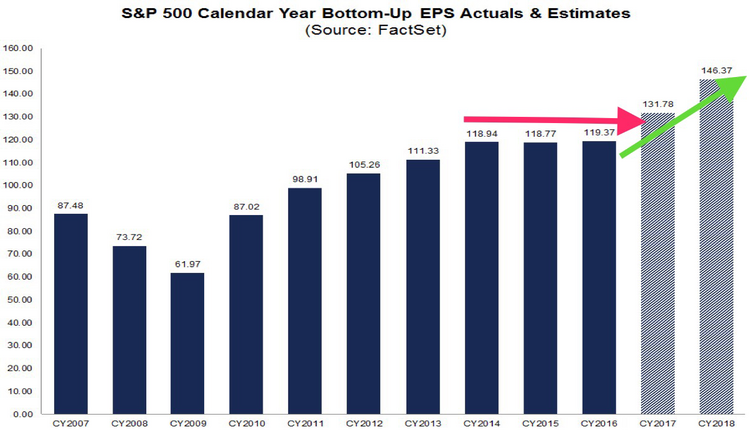It's Harder Than It Looks
“I thought it would be easier.” – Donald Trump
I won’t add to the barrage of voices that discuss the nuances of the Trump Presidency on a daily basis. You can get plenty of that from almost any media outlet. However, I think President Trump’s quote reflecting on his first 100 days in office is an outstanding summation of what’s ahead for investors.
Looking back since the financial crisis, investors could simply say it’s been easy to be in the markets. I hear many of the following comments on a regular basis:
- “The markets have been hot and it’s been easy to make money.”
- “Anyone could make money in this market.”
- “How hard can it be to get 8 percent?”
- “As advisors, you guys must have it easy right about now.”
- “My allocation should be on autopilot.”
However, and this is a big 'however,' nothing could be further from the truth. How do I know? Just take a look at my career as a professional investor for the past thirty years. Currently, I’m fifty-one years old; my entire adult life (slightly prior to drinking-age life, to be precise) has been managing money for others.
Now, let’s take a look at a chart of the S&P 500 assembled by the folks at Collaborative Fund. [i] I think it provides a good summary of the mental challenges when it comes to investing.
In fact, I know several investors who moved to cash the day after Trump was elected as president.
Since the election, the S&P 500 is up 16.29 percent and a 60/40 balanced portfolio is up 11.35 percent. Now ask those investors who went to cash just how easy it is to invest. [ii]
Here is an anecdotal story from the folks at Collaborative Fund that reflects exactly what I mean: [i]
“Or take Warren Buffett’s 2008 investments in several banks. Looks easy in hindsight – cheap! Good companies! But Buffett made his offers the same week PIMCO CEO Mohamed El-Erian told his wife to take out as much cash from the ATM as she could because the odds were so high that the banking system would collapse.”
Many of our readers don’t hire investment advisors because they think investing is easy, and on occasion, it can seem that way. This just happens to be one of those occasions. Despite this easy summer season that investors are enjoying, we are still losing sleep. Not because today was easy; after all, you’ve already been paid your returns for today’s phenomenal earnings numbers. We lose sleep simply because of the uncertainty of tomorrow. [iii]
There’s the uncertainty where we do not know what’s going to happen in the upcoming 12 to 18 months that makes investing so difficult. Or, for those facing a significant demand on their investments, such as state pensions, universities, charitable organizations, and retirement, perhaps it’s the uncertainty of what could happen in the next five years that makes investing so difficult.
Looking ahead, corporations will likely face much higher hurdles as they try to continue to grow their earnings. While 10.1 percent earnings growth is a great number that’s certainly achievable in the short-term, that type of growth is simply not sustainable over a much longer period of time. [iii]

Over the next eighteen months, the Fed is projected to continue raising short-term rates while simultaneously putting an end to purchasing long-term Treasury and mortgage-backed securities. With the outcome of the Fed’s balance sheet normalization plans are still widely debated, it’s likely to lead to additional flattening in the yield curve, which is a strong indicator of a nearing recession. [iv]
We must take the possible recession indicators into consideration, alongside a host of many other looming geopolitical events:
- North Korean nuclear proliferation
- A trade war with China
- Russia’s aggressive actions in and around the Ukraine
- Iran as a growing regional influence
- Destabilization of the oil markets driven by non-OPEC countries, such as the United States
- Cryptocurrency’s potential ability to disrupt the U.S. dollar as the reserve currency
- Possible large-scale terrorist attacks
- Political instability in our own country
Yes, along with the preconceived and imaginary threats, there are also very real threats that could affect any investment thesis. These threats influencing investments is not a new idea if you reflect on the last thirty-plus years. Additionally, this also shows that while it might seem like it now, it’s not that easy to navigate these investment waters, and it has never been easy.
If you have questions or comments, please let us know. We always appreciate your feedback. You can contact us via Twitter and Facebook, or you can e-mail me directly. For additional information, please visit our website.
Tim Phillips, CEO, Phillips & Company
Robert Dinelli, Investment Analyst, Phillips & Company
References:
i. http://www.collaborativefund.com/blog/every-great-investment-hurts/
ii. Bloomberg LP
iii. https://phillipsandco.com/files/6915/0212/4534/EarningsInsight_080417.pdf
iv. https://www.treasury.gov/resource-center/data-chart-center/interest-rates/Pages/Historic-Yield-Data-Visualization.aspx